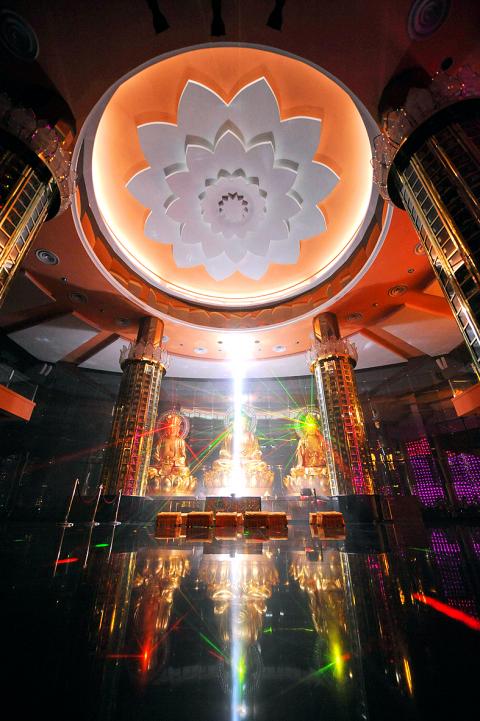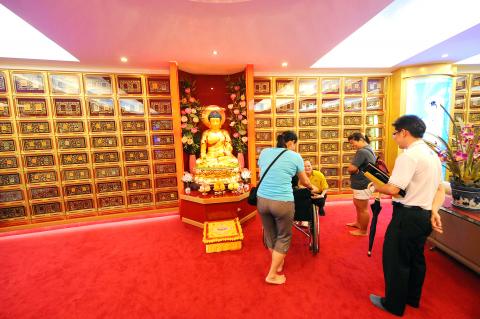Funerals are normally somber affairs, but at the Nirvana Memorial Garden in Singapore mourners could be forgiven for thinking they had strayed into a luxury hotel with a mystical Asian theme.
The self-proclaimed “six star” columbarium, where families can store the ashes of their loved ones for a fee, offers a modern and lavish twist to the ancient tradition of honoring the dead.
At a recent ceremony in a dark, cavernous auditorium, a deep male voice intoned in Mandarin: “I will live on happily in your image and always remember you.”

PHOTO: AFP
Green and red laser beams shot out from the foreheads of three 10m tall gold-plated Buddhas as soothing chants and ambient music played from cinema-quality loudspeakers.
Suddenly, a beam of pure white light from above illuminated the main attraction: An urn containing the ashes of a recently cremated person, sitting on a revolving pedestal shaped like a lotus flower.
The 13,000m2 center is the biggest and most ambitious project by Malaysia-based columbarium operator Nirvana.

PHOTO: AFP
From the “check-in” to the long-term stay, the company, which operates smaller projects in Taiwan, Indonesia, Cambodia and Vietnam, consciously replicates the feel of a top hotel.
“Actually it’s not for the dead people, it’s more for the live people,” said Phang Siang Yang, Nirvana’s country head in Singapore, a largely ethnic Chinese society with a rich, but rapidly aging population.
“We encourage the next generation to always come and visit and pray,” he said, adding that it was important that descendants of the dead “won’t feel that this is an eerie or scary place.”
Entering the lobby of one of the center’s two blocks, one is greeted by a giant gold-plated Buddha statue towering over a water feature.
Cream-colored leather sofas are arranged in accordance with feng shui — the Chinese belief that positions of objects directly affect fortune.
Inside the complex, gold-plated niches, Buddha statues and ancestral tablets await the ashes of the departed in fully air-conditioned “suites” complete with carpeted floors and sofas.
As in hotels, customers are issued magnetic swipe cards which open electronic doors and switch on lights designed to produce a soft, warm glow.
The services do not come cheap.
Charges range from a one-off fee of US$2,880 for an “economy” suite with a single niche to US$167,380 for a “royal” suite that can house an entire family’s ashes.
Revenues now stand at about US$1.5 million per month, barely a year and a half after it started full-scale operations, marketing manager for Nirvana in Singapore Jessie Ong said.
To date, roughly 50 percent of the columbarium’s 7,518 niche lots have been taken up.
A third block will be completed in the next phase of development.
“We’re still seeing the potential,” Phang said. “I think within another few years’ time, the aging population will reach about 20 percent.”
As a result of its low birth rate, close to nine percent of Singapore’s population was aged 65 years and older last year, with the proportion expected to rise to 20 percent by 2030, according to official statistics.
Phang also wants to promote Nirvana Singapore as a tourist attraction and plans to furnish a mini-gallery with Buddhist relics.
A landscaped garden decorated with stone tablets engraved with early forms of Chinese calligraphy and a temple with an elaborate lighting display are also in the works.
“This is our vision, that this place becomes a tourist attraction and temple,” Phang said with a smile.

The US dollar was trading at NT$29.7 at 10am today on the Taipei Foreign Exchange, as the New Taiwan dollar gained NT$1.364 from the previous close last week. The NT dollar continued to rise today, after surging 3.07 percent on Friday. After opening at NT$30.91, the NT dollar gained more than NT$1 in just 15 minutes, briefly passing the NT$30 mark. Before the US Department of the Treasury's semi-annual currency report came out, expectations that the NT dollar would keep rising were already building. The NT dollar on Friday closed at NT$31.064, up by NT$0.953 — a 3.07 percent single-day gain. Today,

‘SHORT TERM’: The local currency would likely remain strong in the near term, driven by anticipated US trade pressure, capital inflows and expectations of a US Fed rate cut The US dollar is expected to fall below NT$30 in the near term, as traders anticipate increased pressure from Washington for Taiwan to allow the New Taiwan dollar to appreciate, Cathay United Bank (國泰世華銀行) chief economist Lin Chi-chao (林啟超) said. Following a sharp drop in the greenback against the NT dollar on Friday, Lin told the Central News Agency that the local currency is likely to remain strong in the short term, driven in part by market psychology surrounding anticipated US policy pressure. On Friday, the US dollar fell NT$0.953, or 3.07 percent, closing at NT$31.064 — its lowest level since Jan.

The New Taiwan dollar and Taiwanese stocks surged on signs that trade tensions between the world’s top two economies might start easing and as US tech earnings boosted the outlook of the nation’s semiconductor exports. The NT dollar strengthened as much as 3.8 percent versus the US dollar to 30.815, the biggest intraday gain since January 2011, closing at NT$31.064. The benchmark TAIEX jumped 2.73 percent to outperform the region’s equity gauges. Outlook for global trade improved after China said it is assessing possible trade talks with the US, providing a boost for the nation’s currency and shares. As the NT dollar

The Financial Supervisory Commission (FSC) yesterday met with some of the nation’s largest insurance companies as a skyrocketing New Taiwan dollar piles pressure on their hundreds of billions of dollars in US bond investments. The commission has asked some life insurance firms, among the biggest Asian holders of US debt, to discuss how the rapidly strengthening NT dollar has impacted their operations, people familiar with the matter said. The meeting took place as the NT dollar jumped as much as 5 percent yesterday, its biggest intraday gain in more than three decades. The local currency surged as exporters rushed to